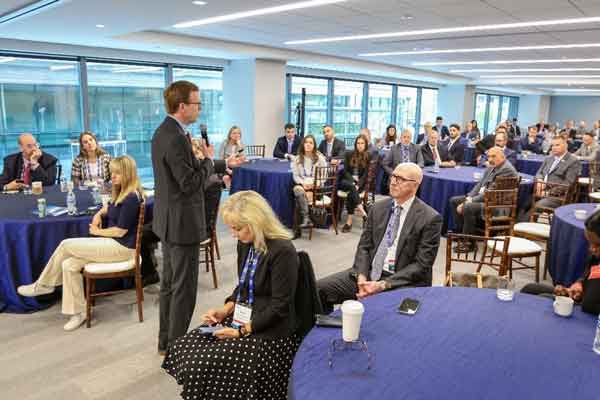Recognizing the new South Dakota Republican Party.
Which faction are you: New Internet Populist or Traditional GOP?
I noticed a new effort on Facebook that took off the other day where a group with many familiar names declared that they want legislation that would “obligate the National Guard to shoot down these poison pushing planes.” Literally, they want planes with “chem-trails,” which would include passenger jets shot out of the sky.
The problem is, it is nothing but a fringe conspiracy. What they call chem-trails are actually condensation trails that form behind jet aircraft, resulting from the condensation and freezing of water vapor in the exhaust. Even infamous government whistleblower Edward Snowden noted “In case you were wondering: … Chemtrails are not a thing.” But don’t try to tell that to people on Facebook. This is not a new issue; perennial fringe GOP candidate Lora Hubbel had spoken about it for years, but it was always relegated to the outer rings of internet conspiracy.
Yet, here it is anew again 10 years later. BOOM! Instantly Three NE State Representatives, Dylan Jordan, Logan Manhart & Brandei Schoefbauer signed on, as did Dell Rapids Senator Tom Pischke. Two former Representatives chimed in and said “I always believed in this” and the group quickly grew from few dozen to nearly four hundred.
Welcome to the new South Dakota Republican Party. Or at least what we might call a populist faction of it.
The state Republican Party has always had intra-party divisions, and they have flared up from time to time over the decades. When I first became involved in politics in the state, you could see within the party remnants of more moderate Rockefeller Republicans who would buck up against the conservative Reagan Republicans. The SDGOP largely went along for years dominated by Reagan Republicans where generally most seemed to get along as there was always a place in Reagan’s big tent, whether you were small-government, pro-life, free-trade, for cutting taxes, etcetera. The key to Reagan’s philosophy was always that it could be flexible when needed for the greater good.
Yet a few decades later, the SDGOP finds itself split down the middle and driven by 2 groups that find themselves jockeying for control of the party. We have the “New Internet Populist” faction amalgamated from several groups who are now in charge as the dog who caught the car and trying to find something do to with it.
In this collection, you find a number of people driven as much by what they read on Facebook as they do any base political philosophy. Many are Republicans who for years have called for the GOP to purge itself of those who they viewed as less pure and they termed RINO (Republican in Name Only) for not having a strict adherence to sets of rules or platform planks they would make up. Yet ultimately and not just a little ironically, this group were finally ascendant in the SDGOP by joining and being led by former Democrats.
It’s a fusion of Trump voters based on his personality. You can find libertarian Ron Paul Republicans side by side with ‘medical freedom’ proponents, election truthers and ballot hand-counters, anti-pipeline factions along with land-use activists.
The land use activists and pipeline opponents are a group that has brought this faction to the forefront, and interestingly, you see a number of Democrats popping up in this group, coming in from oil pipeline opposition, and traditional Democrat agrarian groups such as Dakota Rural Action who helped bring money into the last South Dakota election from a Jane Fonda Climate PAC. Throw in the chem-trail conspiracists who flow through many of these same threads and you literally have an entire faction of the party which has aspects of traditional populism mish-mashed and threaded together from toxic misinformation on Facebook.
Last election’s pipeline battle gave this group the foot soldiers they needed to nudge themselves into the leadership of the SDGOP, which is now led by Jim Eschenbaum, a self-admitted Obama voter and 32-year Democrat.
That leaves the other group in the Republican Party, and what might be argued as a great silent majority that has been sitting out elections. As evidenced by the record low 17% turnout of the last Republican Primary, many Republicans are strongly repelled by the toxicity that the internet populist group brings to the table.
Traditional Republicans, or Trad GOP are what we might term the groups that have historically been aligned as Republicans. Business owners, Chamber of Commerce members, community and economic development advocates, value-added ag proponents, and others who have been affiliated as Republican voters in the state on the basis of low taxes, smaller government, free-market capitalism, and deregulation. They’ve been more moderate in the past, but time and Reagan conservatism has shuffled some of those tendencies to the background. This group is closer to the vein in which Reagan actually operated; conservative, but pragmatic knowing the realities of governing.
This group largely voted for and supported Trump less for his personality and more for policy. It’s less what he says, and more what he had done in his first term. They were ok with Trump as Mitch McConnel and John Thune worked int he background to put conservative judges on the bench. (Time and outcome will see what this group has to say about the President’s taking a wrecking ball to the country’s economy this week in what some are calling “ruination day”).
The Trad GOP group, while still voting Republican when they do, is most definitely larger. But, they are the quiet majority. They are disengaged and unmotivated which has been contributed to by the toxicity from the New Internet Populists, as candidates argue over their conservative bonafides, without providing specifics on how they will positively affect communities. It is challenging enough to engage a business owner in politics who is busy trying to generate income to pay the bills and survive, when all that rises above the din of politics is that there are those who want to throw their local librarian in jail because they think they are distributing pornographic books.
Hearing that, most community-minded people would rather give their spare time and coin to children’s sports or a vacation or other family activities than spend one moment on politics. Because when all they hear is awful politicians they believe to be crazy who don’t represent them, THEY STAY HOME. And it hasn’t reached critical mass where the other group’s actions affect them enough en masse to come out and vote.
They stay home because they find it ugly. Or worse yet, they’re offended and might switch to Independent. Or at least they talk about it.
The extreme factionalism in the South Dakota Republican Party has not brought people into the tent. It has split them, driven some out, and largely de-funded the party. While there might be a person here and there in the New Internet Populist faction that has the ability to donate, largely this group doesn’t give money to the party. In recent years their activities and the language they use has actually driven away the donor class in the Trad GOP faction.
One recent party official related to me anecdotally that they had a party-minded donor who was going to donate an entire building in Pierre to the SDGOP to use as a headquarters and potentially rent empty space for income. But seeing the other faction in the wings ready to take over, they had no interest in “handing it over to the crazies.”
The story over the last few years has seen donations to the South Dakota Republican Party dry up to nothing. When the Democrat Party is able to pick up low-hanging fruit donors amounting to thousands, the SDGOP will go a month raising less than $50. A far cry from a party once able to command a budget which raised tens of thousands or more monthly in its heyday.
Time will only tell whether the two factions can mend their differences and possibly find a common goal to reach harmony on and work towards, or if the populist group will wither away and be absorbed into the larger but quieter group as has happened in the past.
Until then, intra-party fights between the New Internet Populists and the Traditional GOP in South Dakota will continue to be raucous. And potentially ruinous for the South Dakota Republican Party at large.






